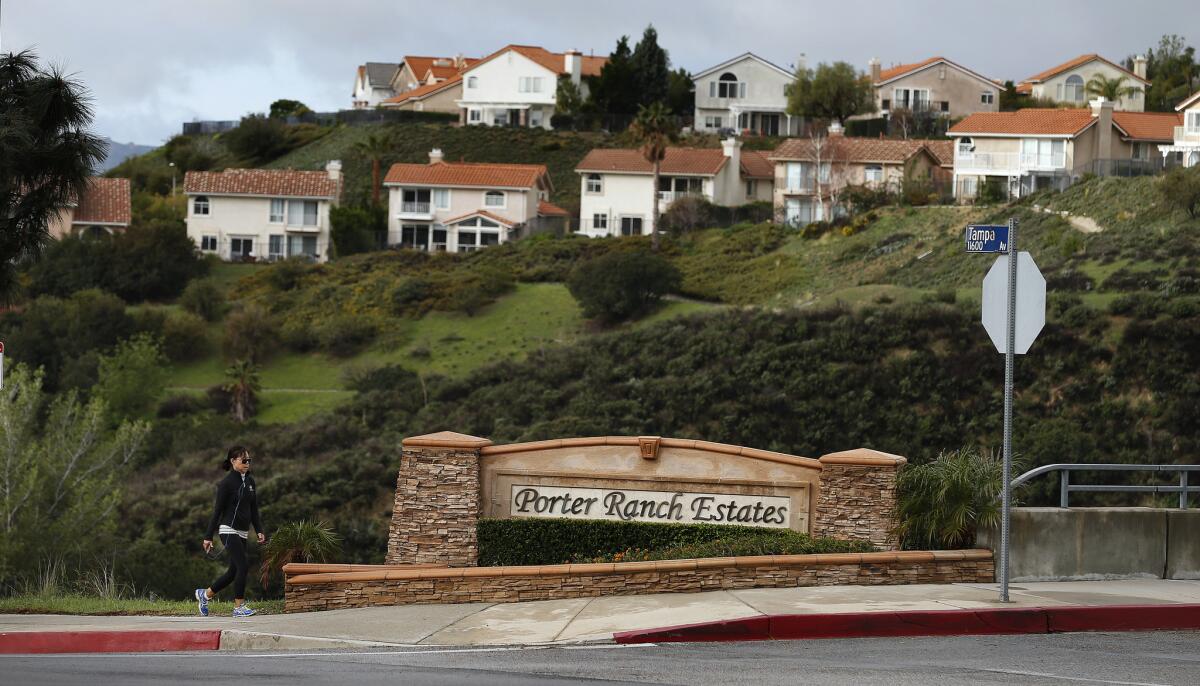Judge orders gas company to give Porter Ranch residents longer to return home after leak

Eunice Kim walks back to her home in Porter Ranch on Feb. 18. Kim said that she and her husband had to move out of their home for more than two months because of physical discomfort from the poor air quality. They moved back in after temporarily staying at her brother’s home in Westwood.
- Share via
A Los Angeles County Superior Court judge has ordered a 22-day extension of the time that Southern California Gas Co. will continue footing the bill for residents driven from their homes by the gas leak at its Aliso Canyon storage facility.
The decision Thursday by Judge Elihu M. Berle means that residents who relocated to hotels and motels will have their stays paid for by the gas company through March 18 while county officials do additional air testing.
The extension will apply only to those residents who remained in hotels through Thursday. Anyone who checked out Wednesday or earlier is not eligible under the order.
The gas company has been paying for hotels and other temporary accommodation for residents who left the area because of the persistent odor and resulting health effects that included headaches, nausea and nosebleeds.
Los Angeles County health officials have said those symptoms probably resulted from exposure to mercaptans, which are compounds added to natural gas to give it a rotten egg-like smell. They have also said they don’t believe that there will be long-term health effects.
After state officials announced that the leak had been stopped and the problematic well sealed Feb. 18, displaced residents staying in hotels were given eight days to return to their homes in Porter Ranch and other communities near the leak.
The eight-day window was the result of an agreement worked out by Los Angeles city officials and the gas company. It pushed back the initial planned relocation deadline of 48 hours.
County supervisors said the period should be 30 days. The county filed a court motion Wednesday in an attempt to force an extension.
Supervisor Michael D. Antonovich, whose district includes Porter Ranch, said the extra time is needed for county public health officials to complete air sampling in vacated homes.
“This is the first time that justice has been rendered in helping these victims get back to a normal life,” he said in an interview after the hearing Thursday. Antonovich called the eight-day period the city had negotiated with the gas company “totally irresponsible.”
Mayor Eric Garcetti and City Councilman Mitch Englander, who represents Porter Ranch and is running for the county seat that Antonovich will vacate at the end of the year, applauded the court’s ruling in statements.
Gas company officials said they were disappointed by the judge’s decision.
“The relocation plan that was negotiated with the city of Los Angeles took into consideration a full range of factors, including air quality, health and safety, logistics and proper notification,” the company said in a statement. “… This last-second ruling extending the relocation plan upends this collaborative process.”
Gas company officials pointed to air testing data that showed air quality has returned to pre-leak conditions and said the county’s action “conflicts with the science and health assessments made by the county’s own health experts.”
In court filings, county officials said some residents who returned home after the leak ended have continued to report symptoms including sore throats, headaches, nausea and asthma attacks.
Deborah J. Fox, a private attorney who represented the county, said other residents “are confronted with returning to a home that cannot be established to be safe.”
Attorney David L. Schrader, representing the gas company, said that about 2,000 people who relocated had returned home and that the county had given only “anecdotal evidence … of complaints by a handful of individuals.”
The company has been paying about $2 million a day to put up some 3,400 households in hotel rooms, Schrader said. Extending the timeline, he said, “is tantamount to an award of millions of dollars of damages.”
He argued that it would be not only costly but logistically impossible to extend those stays past the planned end date because hotels had already been notified that the stays would end Thursday.
Fox disputed that, saying it would be simple to extend hotel stays.
“It is just going to be costly for the gas company to do the right thing for the residents,” she said.
The judge said in making his ruling that “the risk of health hardship to the residents” is greater than the risk of financial hardship to the gas company.
The court order resulted in jubilation among displaced residents, but also in confusion among many of them and at the hotels involved. Jim Frantz, an attorney representing a group of residents who are suing the utility, said he had heard from some whose rooms had already been rented to other customers, leaving them scrambling to find a new place to stay.
Frantz said that many had still not received the reimbursements they were already owed from the gas company for their hotel stays, amounting to thousands of dollars in some cases.
Twitter: @sewella
ALSO:
A ‘super bloom’ of wildflowers blankets Death Valley’s landscape
Judges weigh arguments over teacher vs. student rights in landmark tenure lawsuit
Prosecutors decline to charge LAPD sergeants in death of Omar Abrego
More to Read
Sign up for Essential California
The most important California stories and recommendations in your inbox every morning.
You may occasionally receive promotional content from the Los Angeles Times.











